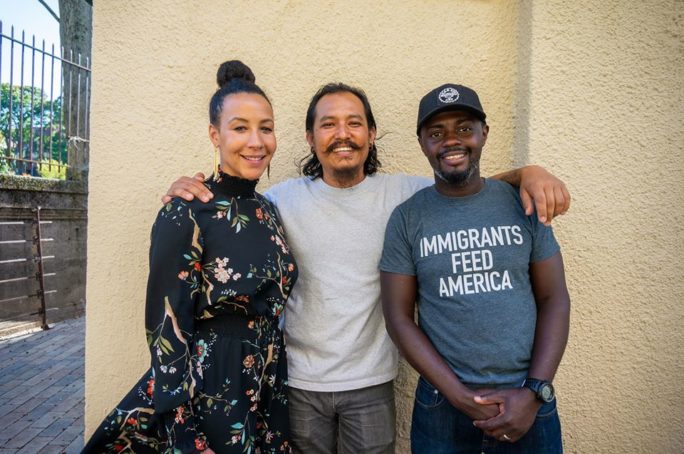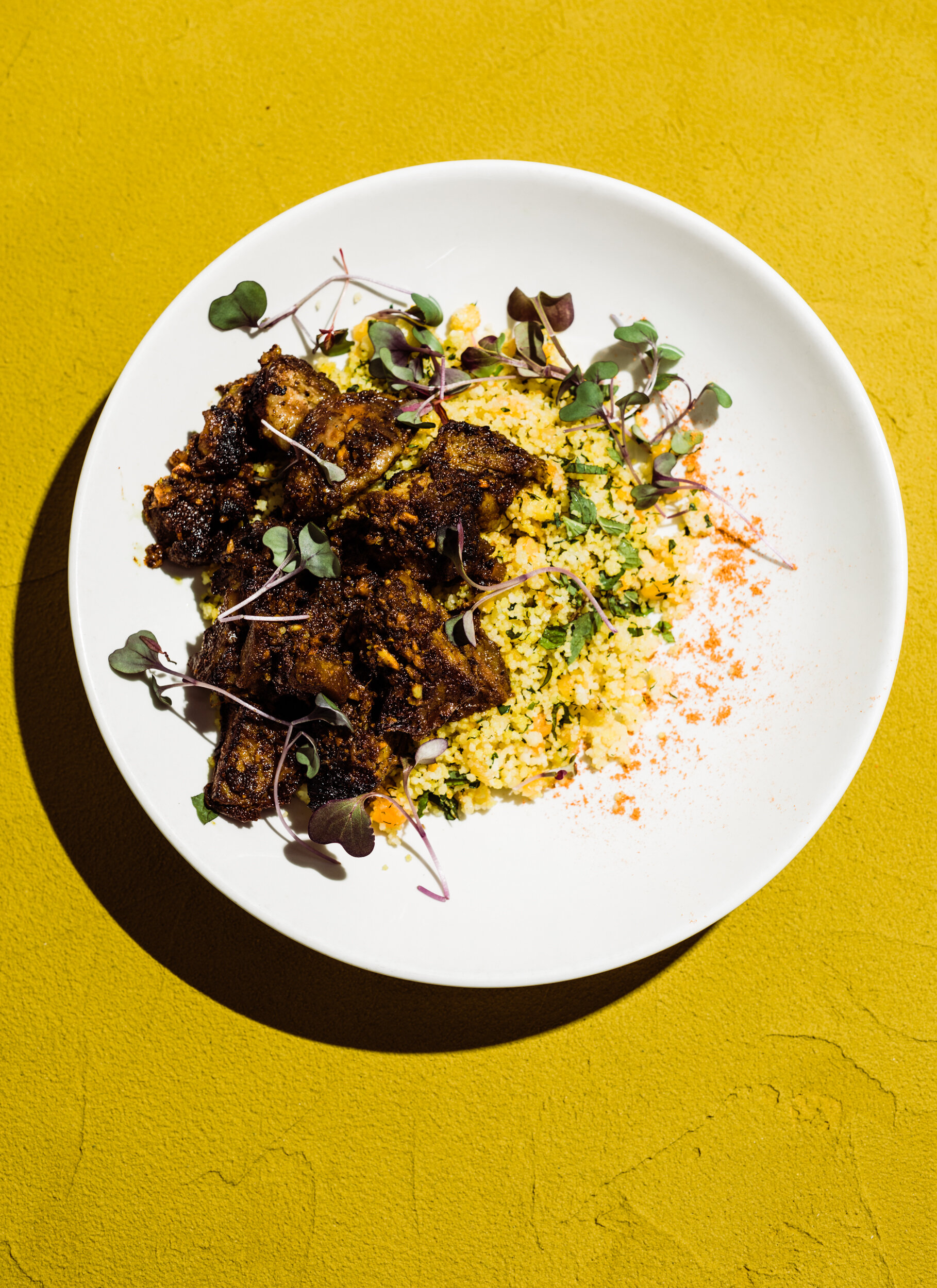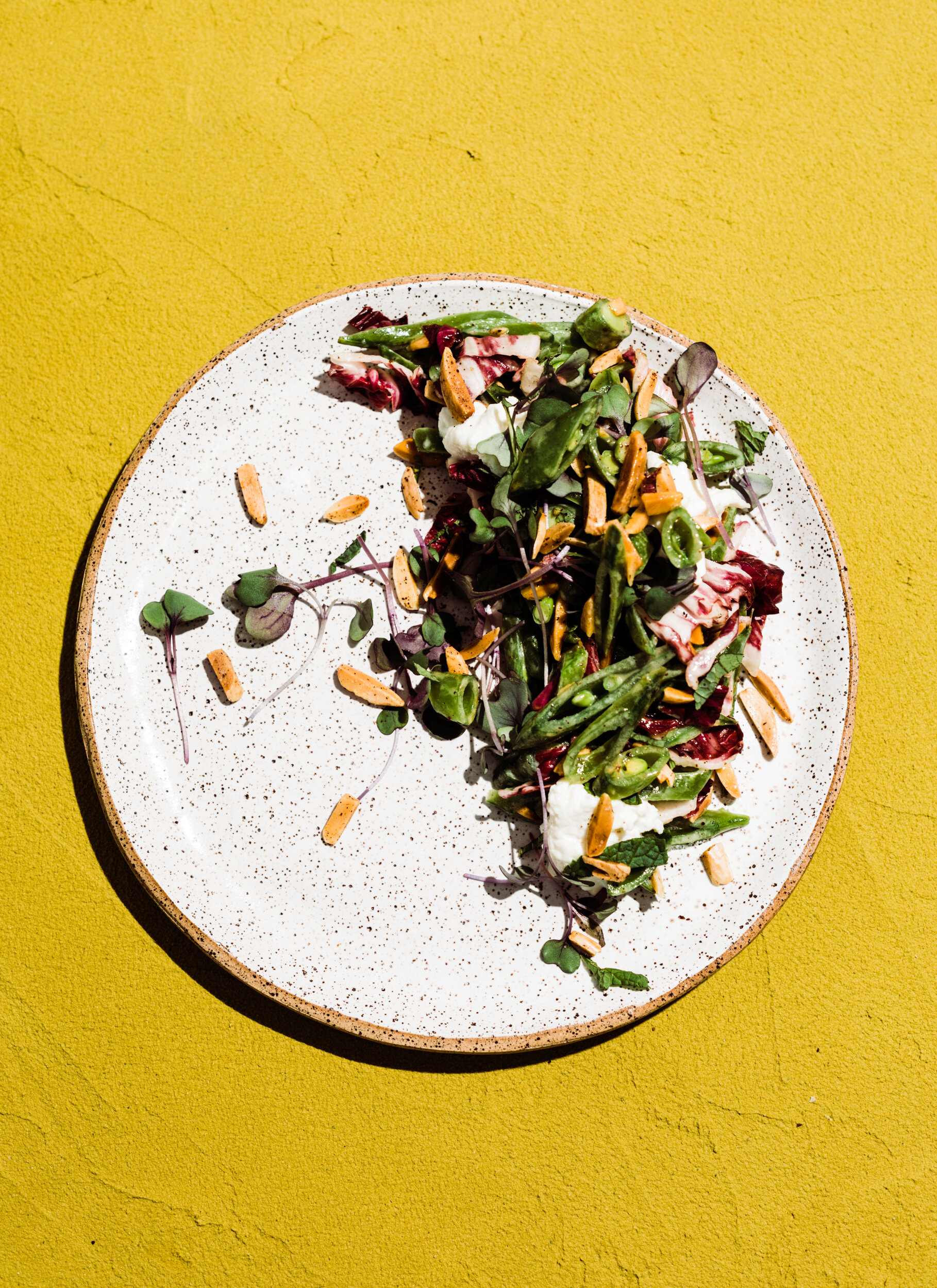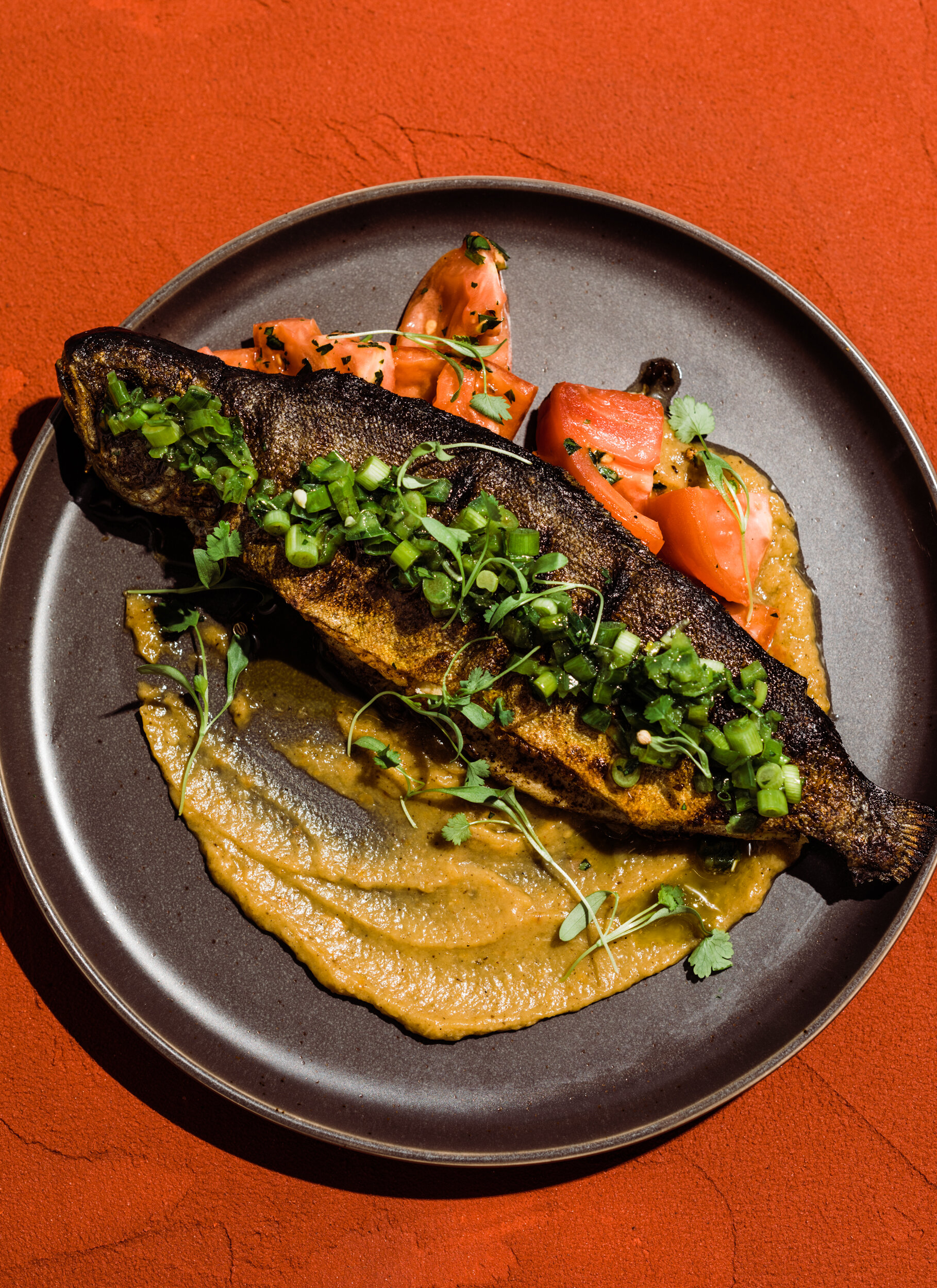
June 20, 2021 “Seeking Comfort”: Edible Boston’s Shelby Larsson catches up with Comfort Kitchen team
While you might not have seen construction activity for many months at the Upham’s Corner Comfort Station, rest assured that planning continues behind the scenes toward our plans to bring the former public restroom back to life as Comfort Kitchen. Restaurateurs Biplaw Rai, Nyacko Pearl Perry and Kwasi Kwaa are working collaboratively with architects at Supernormal to adapt their original restaurant design concept to be even more flexible so they will be able to adapt to current and future food service restrictions as required. See the article by Shelby Larsson below for an in-depth catch up on what the Comfort Kitchen Team has been up to.
It’s a blustery spring day and I rush down Centre Street in Jamaica Plain to pick up my dinner order. It’s the end of a long, busy week and I am distracted as I enter the bright and cheerful entrance of Little Dipper, where Comfort Kitchen has just begun a long-term residency while they await the opening of their permanent space. At once I am welcomed by Biplaw Rai who invites me to sit down and offers me a steaming mug of chiya, a traditional Nepali blend of tea and spices. I take a sip and I am instantly calmed and focused on being right here, right now.
Later, I ask Rai to tell me more about his chiya. He tells me that in Nepal, instead of asking people “How are you today?” they say “Have you had your tea today?” Any time you enter a Nepali home, you are offered chiya. For him, it is part of his coming-of-age story—when he emigrated to the United States at the age of 18, it became extremely important to him to master his own version of chiya to stay connected to his home county. He has tweaked that recipe over the years, and it now includes a balanced ratio of his own Comfort Kitchen spice blend—which includes green cardamom, cinnamon, cloves, black peppercorns—some ginger syrup, Assam tea and oat milk. It is delicious.
I take the dinner to a friend’s house, where we dig in with excitement. The current Comfort Kitchen menu at Little Dipper is described as “Moorish” in spirit. This is a perfect example of what the Comfort Kitchen team wants to do: follow the flavors across the globe. Tracing the Moors’ route from North Africa across the Mediterranean and on to South Asia, they apply that knowledge to seasonal New England ingredients. This translates to a menu featuring a snap pea salad, fresh and bright with mint, ricotta and sumac-roasted almonds, reminiscent of a first course of mezze or tapas; a charred spiced chicken served with a preserved lemon marmalade that makes the dish sing; and then back to Spain with a luscious slice of Basque cheesecake, the lightly browned top giving way to a creamy, light cake below.
The nomadic nature of these flavors and influences also recalls the way Comfort Kitchen has been operating over the past few months. Since last spring, the Comfort Kitchen team has popped up in a range of restaurants across the Greater Boston area, taking over kitchens or working alongside friends at Tanám in Somerville’s Bow Market, Exodus Bagels in Roslindale and Sweet Basil in Waltham. Earlier this year, they brought their ideas to Mei Mei, where they introduced a lively menu that explored the intersection of the American South and West African cuisine, with South Asian influences sprinkled throughout. The team sets up shop each Saturday and Sunday afternoon at Popportunity Marketplace in Cambridge’s Central Square, where the focus has been on globally inspired snacks, like kafta and lentil sliders.
Though they have proven to be quite adept at putting together remarkable pop-up dining experiences, this was not the plan when the idea behind an all-day café and dining destination in Upham’s Corner began to come together in 2019. It is, however, the result of a remarkable and savvy pivot.
THE COMFORT STATION
A few years back, Rai—a food industry veteran and a co-founder of Dudley Café—heard about an interesting opportunity. There is a small building along Columbia Road in the Upham’s Corner neighborhood of Dorchester. It backs up to Dorchester North Burying Ground, one of Boston’s oldest cemeteries, and one of the few that includes the marked graves of enslaved people. If you notice this structure (and many do not), you might take note of its distinctive cross-hatch windows, its terra cotta roofline and overall sense of diminutive charm.
Built in 1912, the mission-style stucco building once served as a “convenience station” to accommodate the expanding streetcar system in Dorchester. (Read: bathrooms— a place to rest.) When the nonprofit real estate development organization Historic Boston, Inc., gained control of the site, it was clear that this building could become an anchor for the neighborhood. But it needed the right concept, and the right people to take it on.
At the same time, Rai’s partner, Nyacko Pearl Perry, an organization development consultant, had been deep in the process of surveying the surrounding Upham’s Corner community about how to make improvements and changes from within. With a new public library branch, a revamped Strand Theatre and more housing in the works, change is coming to the neighborhood. There are big plans to invest in its infrastructure and to designate the area as an Arts and Cultural District for the City of Boston.
Perry understood that what the neighborhood wanted was good food and a place to gather; a space that would empower the entrepreneurial talent that exists in the neighborhood. There was a real hunger for development without displacement, with an eye toward helping the larger neighborhood become a creative hub in Boston. She knew that a concept at the Comfort Station could be all of those things.
To bring it all together, Rai turned to his friend and longtime industry collaborator Kwasi Kwaa. The two had first connected years ago at Hi-Rise Bakery in Cambridge, where they bonded over their immigrant stories and their love of food. Kwaa, who came to live in Somerville from Ghana at the age of 11, found that the restaurant industry was a place where you could get a job and make money as a young immigrant. After years in restaurant kitchens, he started his own pop-up series, The Chop Bar, with co-chef Shelley Nason. A global street food concept based on the small snack shacks found in Ghana, it was a way for Kwaa to learn as much as he could about his native homeland’s history. They began to pop up at Dudley Café on a regular basis. There, Rai and Kwaa had the chance to talk more about the restaurant industry—the good, the bad and the ugly. They shared the belief that they could build a restaurant that is transformative, inside and out.
Together, Rai, Perry and Kwaa began to coalesce around a mission, which they refer to as the “three Cs”: collaboration, cross-cultural understanding and community building. Comfort Kitchen will be many things: an all-day café, a restaurant at night, a community space and ultimately serve as an incubator kitchen. “This is not just a restaurant, but a vehicle to do things that we love. Community building is a shared passion. Upham’s Corner is a shared passion.” And for the food? A celebration of global comfort food, inspired by the African diaspora and the spice trade route. Then COVID-19 hit in March 2020, and like everything else, all building activity came to a halt.
In those restless and scary early days of the pandemic, the team continued to meet virtually, planning and sharing ideas. With their timeline pushed back and a lot of pent-up energy, they began to cook. In the fall of 2020, the team operated pop-up restaurants to raise funds for organizations in need. In partnership with the Urban Farming Institute, they offered free meals to families in their communities. The pop-ups have allowed the team to learn, to feed people, and also to introduce themselves to diners across the region. Upham’s Corner is not a food destination—yet. But the hope is that people will fall for their food and the spirit of the place. The hope is that they will come seeking comfort and celebration.

THE COMFORT FOOD
Comfort food is immigrant food. Comfort food is not fancy, but it is delicious and nostalgic. There are common threads across cultures—the meatball of Italy is similar to the kofta of Turkey. Grits, congee, rice, porridge, polenta are all comfort foods in their respective cuisines around the world. Consider the similarities between dumplings, pierogi, ravioli—the list goes on and on.
So what brings comfort to the Comfort Kitchen team? For Rai, there is no hesitation: “Momos.” The Nepali Momo in particular: There are no spices, just garlic, ginger, meat and onion, with a thin wrapper. For Perry, who spent time in Botswana with the Peace Corps, it’s Braii, the traditional grilled meat, and bogobe, made from sorghum and resembling grits or polenta. Kwaa answers in an instant: Jollof. He describes the quintessential rice dish of Western Africa with joy in his eyes and hunger in his words. Jollof is celebratory, but it is also for everyday occasions. You have it at Christmas, you have it for family dinners.
At Comfort Kitchen, the menus will change frequently as the partners dig in deeper to understand the history of food, its intersectionality and finding where culinary traditions meet. But, they say, there will ALWAYS be momos and jollof on the menu. “Each dish will be a tight little history on a plate,” celebrating and tracing the roots of a specific people or a specific ingredient.
FRIENDS, FAMILY AND GROWTH
The Comfort Kitchen team plans to intentionally stay small at first and grow thoughtfully. This is a business made up of friends and family: Rai and Perry are married, and they’ve known and worked with Kwaa for years; Rita Ferreira, Kwaa’s wife, has jumped on board to do their branding. Quality of life is extremely important: There is a strong belief that all team members should be able to explore and focus on what matters most to them.
Rai, Perry and Kwaa also dream of creating an incubator space in the basement kitchen. This would allow their team to pay it forward, to give other restaurant teams the chance to work out the kinks before opening in their own space. To be in a real restaurant kitchen, to be in the field with all the various potential challenges—this is true preparation for a future restaurant.
When COVID hit and the delays piled up, investors urged the trio to streamline their plans and get their own restaurant and goals off the ground before introducing what will be a complex logistical challenge. They are holding on tight to their original idea, though. They know that to change the game, to really clear the high bar they are setting, they need to continue to help lift up others, as they have been lifted themselves.
- comfortkitchenbos.com
- https://www.edibleboston.com/blog/2021/6/14/seeking-comfort
This story appeared in the Summer 2021 Issue. Photos by Michael Piazza






